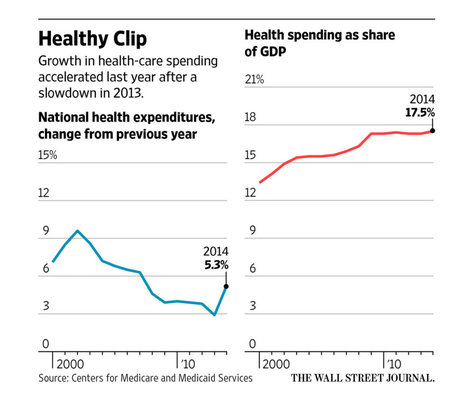 Source of graph: online version of the WSJ article quoted and cited below.
Source of graph: online version of the WSJ article quoted and cited below.
(p. A3) WASHINGTON–Growth in U.S. health-care spending is accelerating after reaching historic lows, a pickup largely attributed to the millions of Americans who have gotten health coverage under the Affordable Care Act.
Spending on all health care increased 5.3% in 2014, according to a report Wednesday [Dec. 2, 2015] from actuaries at the Centers for Medicare and Medicaid Services. That compares with the 2.9% growth in 2013, which marked the lowest rate since the government began tracking the gains 55 years ago.
The return to more robust growth after a slowdown in spending had been anticipated by economists. Still, it is likely to add to criticism that the 2010 health law isn’t doing enough to rein in costs. The report, based on 2014 government numbers and published in the journal Health Affairs, follows five consecutive years where average spending growth was less than 4% annually.
For the full story, see:
STEPHANIE ARMOUR. “Health Spending Picks Up.” The Wall Street Journal (Thurs., Dec. 3, 2015): A3.
(Note: bracketed date added.)
(Note: the online version of the article has the date Dec. 2, 2015, and has the title “Growth in U.S. Health-Care Spending Picks Up.”)

